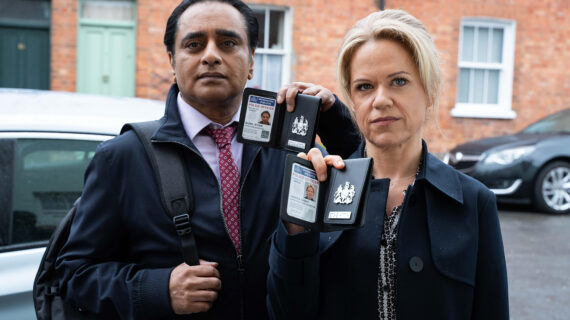Announcer:
The following program is a PBS Wisconsin original production.
Frederica Freyberg:
The National Republican Party has declared the events of January 6 at the U.S. Capitol “legitimate political discourse.” An immigrant rights group in Wisconsin fights a broad subpoena for records in the Republican election probe. And the Omicron surge reverses course, as cases plummet to levels more closely resembling last fall.
I’m Frederica Freyberg. Tonight on “Here & Now,” former GOP Wisconsin congressman Reid Ribble speaks out on recent actions from his party. State Epidemiologist Dr. Jasmine Zapata provides some perspective on the latest twists and turns of the pandemic. And a community health leader explains how care programs for pregnant mothers and babies became million-dollar enterprises supported by Medicaid dollars. It’s “Here & Now” for February 11.
Announcer:
Funding for “Here & Now” is provided by the Focus Fund for Journalism and Friends of PBS Wisconsin.
Frederica Freyberg:
In the last week, the Republican National Committee called the events at the U.S. Capitol on January 6 “legitimate political discourse.” Later walking that back some to say they didn’t mean the rioters. The RNC also censured two of their colleagues for participating in a congressional committee investigating January 6. This drew condemnation and a joint statement from more than 100 Republicans, including leaders and former officials who said, “There can be no justifying the horrific attack that day, and we condemn the committee for excusing the actions of men and women who battered police officers, ransacked our nation’s Capitol, calling for hanging the Vice President of the United States, and sought to overturn a free and fair election.” Wisconsin’s own former Republican U.S. Representative Reid Ribble, who served the 8th congressional district, was among those who signed the letter. He joins me now from his home in Tennessee. And Mr. Ribble, very nice to see you again.
Reid Ribble:
It’s good to see you. Glad to be with you.
Frederica Freyberg:
So was the censure of two members of Congress kind of the last straw for you here?
Reid Ribble:
Well, I’ve been fairly outspoken about it, on a number of the media cases as well as on my own Twitter account, about January 6th. The censure just had a tendency to rub me the wrong way because A) the RNC really doesn’t get involved much with congressional races and B) the language of the censure where they act like it was normal political discourse was just offensive to me. That’s not what political discourse looks like in this country. I served six years in the House of Representatives and not a single person ever came in and tried to beat down my door or threaten me when I was in Congress. That’s what real discourse looks like, when voters come in and they talk with their elected officials about what concerns them and try to address any grievance they might have. Breaking windows, injuring police officers, violently attacking people, there’s no place for that in our country.
Frederica Freyberg:
The letter that you signed off on described the RNC of ceding control to “grifters and extremists.” Do you believe that the party has turned to that?
Reid Ribble:
Well, there are certain elements of it for sure. I mean, I would say that former president Trump is leading the pack in that regard. I don’t think that language was too subtle. And this sense of as long as we keep up the victimhood and making people feel like they’ve been victimized here, they’ll keep sending in their money, it’s pretty obvious that’s a strategy that’s been going on.
Frederica Freyberg:
So the RNC statement that the January 6 attack was “legitimate political discourse” sparked outrage, as you just mentioned, but what about the fact that they walked that back then and said that, you know, they weren’t talking about the kinds of people who broke windows or injured police officers?
Reid Ribble:
I can’t help but that — every single time you make a statement, walking it back is always less covered than the actual statement itself. And what they realized, and I think what Ronna McDaniel realized is they kind of stepped in it with that statement, and they wanted to distract away from what they said the January 6th committee was doing, while simultaneously shining this bright spotlight on it for political — for people who live in the political world, that was practically political malpractice.
Frederica Freyberg:
Should ordinary citizens and voters just accept that this is the kind of the new or at least faction of the new Republican Party?
Reid Ribble:
It sure feels like that to me. And even as I’m out and about and I talk with a lot of folks, there’s kind of a ho-hum attitude about the extremes on both sides of the party. Whether it’s the AOC-Bernie Sanders wing wanting to spend $6 trillion that everybody knows is never going to happen, or the hard right wing, you know, in flaming up passions the way they did that caused January 6 and saying the election was stolen. Most Americans, they want professionals to deal with this stuff and be civil one toward another, and it’s this small fringe on both sides of the parties that make the most noise. It’s unfortunate.
Frederica Freyberg:
And there is a lot of noise. So what would you tell your former constituents here in Wisconsin who may now follow and support the words and deeds of Republican leaders who may disregard the violence and the outcome of the election in fealty to Donald Trump, what would you tell your former constituents?
Reid Ribble:
I would tell them that they need to look at the facts. President Trump challenged this election 60 times in the courts. He lost. He challenged it with numerous recounts. He lost. He’s challenged it with several audits. He’s lost. The fact of the matter is, there was not significant enough fraud in this election to have a different result. And whether they like it or not, President Joe Biden is the president of the United States and their best chance of changing the discussion would be at the polls in November to give the Congress to their preferred candidates so that the policies that they’re hoping to see achieved get done through a normal political means in this country, but not through violence or threats of intimidation. I don’t think that’s how Americans should operate.
Frederica Freyberg:
What is your response or reaction to the ongoing investigation into the 2020 election here in Wisconsin?
Reid Ribble:
I think they ought to put to bed. I mean, the fact of the matter is, President Biden won the election because too many Republicans decided to split their vote. They voted for their Republican state assembly member. They voted for their Republican senators in the state of Wisconsin. They voted for Republican members of Congress, and then they voted for somebody else or didn’t vote for president. There were enough of those people who split their votes that caused president Trump to lose the election. And the count’s been done. It’s been certified. It’s been recounted. If they have a concern about election integrity, they should deal with that from a legal standpoint, but hanging on to what happened there and trying to say it was fraudulent doesn’t help anybody. Doesn’t change anything.
Frederica Freyberg:
We leave it there, former congressman Reid Ribble. Thanks very much for joining us.
Reid Ribble:
You’re welcome. Thank you, Frederica.
Frederica Freyberg:
In the investigation into the 2020 election in Wisconsin, former Supreme Court justice Michael Gableman issued a flurry of subpoenas seeking documents and testimony. The orders went out to mayors, election officials, the Evers administration and an immigrant rights group. That group, Voces de La Frontera, is now suing over the subpoena. Voces joined an Attorney General Josh Kaul lawsuit on behalf of the administrator of the Wisconsin Elections Commission. How did the immigrant rights group get swept up in all this? We asked Christine Neumann-Ortiz, executive director of Voces de La Frontera Action. Christine, thank you very much for being here.
Christine Neumann-Ortiz:
Thank you, it’s my pleasure.
Frederica Freyberg:
How surprised were you that your organization was served with this subpoena?
Christine Neumann-Ortiz:
In a certain way, it’s flattering. Flattering in that there’s a recognition that Voces de La Frontera Action, which is the arm of Voces de La Frontera that they were seeking to — all of our documents, any emails related to 2020 elections and future elections as well from a non-governmental body, which is completely outside of even what the realm of this sham review is supposed to pursue. To me it’s a testament that our hard work has really paid off. Voces de La Frontera Action has been organizing the Latinx vote since 2004, It had a huge impact, especially through a program — relational voting program where it’s basically friends and family you know that we built up in a significant way in 2018 and 2020, and it’s a recognition that Latinos here in Wisconsin and multi-racial youth as well, that we’ve had an impact in elections, because this whole sham review is really a continuation from January 6, this baseless allegation that’s intended to undermine the will of the people to really distract from their own record, which has been to block paid sick days that we need during a pandemic, block immigration reform, block driver’s licenses, all of this stuff. So it really is a recognition of the good work that we’re doing. We decided to sue, though, because we think that we shouldn’t take this stuff lightly. And if they’re going to start with us, they’re going to go with others, and so this sham review is like this little McCarthy-ite political theater, but it’s dangerous to our democracy, and we want to make sure we stand up for it.
Frederica Freyberg:
So you described it out of the chutes as flattering, because it recognizes your work, but is it burdensome?
Christine Neumann-Ortiz:
Not — no, I mean, I think it’s baseless, definitely, and it’s part of this total, you know, political theater and sham review where they’re trying to frame a message to continue to assert that false narrative, to really deny the fact that’s been proven over and over and over again that, you know, Biden won Wisconsin. He won it fairly and squarely, but, you know, simultaneous to this frame that they’re doing, there’s also all these attacks going on on people’s able to vote.
Frederica Freyberg:
Specific to the subpoena that was issued to Voces de La Frontera, I mean, did you bend or break election laws as you worked to turn out voters in the 2020 election?
Christine Neumann-Ortiz:
Absolutely not. We have definitely not done so since we started doing elections in 2004. We have been challenged in the past by far right groups. For example, FAIR, which is a group that’s — it’s a white supremacist organization defined by Southern Poverty Law Center, you know, who have tried to — or have some radio DJs make racist allegations about Latinx voters. People know who can vote and who can’t vote. We are about protecting people. So we definitely don’t want people who can’t vote to — we definitely want to make sure — and they know, but the main thing is, is making sure that people who are U.S. citizens, they’re eligible to vote, they have all the information they need and to make sure they cast their ballot. So those are the things that — we’ve never had issues. We have been challenged in the past, and to me, this is just — you know, it’s a statement that Latinos are making a difference in Wisconsin.
Frederica Freyberg:
Christine Neumann-Ortiz, thanks very much, thanks for your time.
Christine Neumann-Ortiz:
Thank you so much.
Frederica Freyberg:
At the Capitol, Republicans released a slate of bills aimed at tying up loose ends in the state’s election law. Loose ends that challenged the law’s intent in new ways as the 2020 elections were held during the unfolding pandemic. Among the issues addressed in the proposed legislation were indefinitely confined voters, outside funding to help administer elections and information that clerks are required to report. Advocates from the disability community voiced concerns that some of the bills would limit voter access.
Woman:
As a disabled voter, I’m concerned with the continued efforts to restrict the constitutional rights of the disabled community to vote. I’m gravely disappointed with the reintroduction of several bills that I believe are presented under the guise of election integrity at the cost of equitable access.
Another Woman:
There are many different disabilities that can cause mistakes, and people should not be punished if they make a significant error. And we have been talking about this and other bills that have been introduced in the past that make it difficult for those populations to get to vote.
Frederica Freyberg:
In the race for governor in Wisconsin, a Republican state representative and Donald Trump supporter throws his hat into the ring. Timothy Ramthun filed Thursday. Republican leadership disciplined Representative Ramthun last month over his false election claims.
On the COVID front, it’s like a case of whiplash. Wisconsin’s 7-day average case number has hit the lowest point this year and is on the way down. That after Omicron sent case numbers sky high just weeks ago. As of today, the 7-day average of new cases in Wisconsin is below 2500. Compared to nearly 19,000 new daily cases at the peak of the Omicron surge. Great news but a little confusing too. Is it over? How should we respond? We turn to chief medical officer and state epidemiologist for community health at the Wisconsin Department of Health Services, Dr. Jasmine Zapata. Doctor, thanks very much for being here.
Jasmine Zapata:
Thank you for having me.
Frederica Freyberg:
So case numbers seem to be declining almost as fast as they surged, but still more than 50 counties remain in the critically high category. Does this mean, though, that the coast is clear?
Jasmine Zapata:
This does not mean that the coast is clear. We are cautiously optimistic. We are hopeful, and we’re thankful that we are starting to see the numbers go down, but we are still in crisis. We are still in a global pandemic and everyone needs to continue to stay vigilant. The ways that people can do that, continue with good hand washing, continue to avoid very large gatherings, continue to encourage others around you who have not already gotten vaccinated or received the boosters to do so. Individuals should do that as well. We need to continue to stay vigilant so that we can continue to see these numbers go down.
Frederica Freyberg:
So does that include things like rapid testing and isolating, you know how people were doing that and madly looking for these tests and couldn’t find them then and now we have stocks of them, but does it include that kind of vigilance?
Jasmine Zapata:
Yes, it does. Thank you for bringing that. I appreciate that question. It is very important if you are feeling sick to stay away from others, to get tested so that you can know exactly what’s going on. So we still do recommend following all local public health guidelines as it relates to testing. And you can do in-home testing, which is a great tool in our toolbox, and you can also go to your healthcare provider, go to local pharmacies and other community-based organizations and sites that deliver testing. So yes, that’s still a very important thing.
Frederica Freyberg:
It does seem confusing, though, because some states are doing away with masking in schools. So we’ve got this extra vigilance still upon us and then other states saying no, we don’t need to mask kids in school. Where do public health officials in Wisconsin stand on masking in schools?
Jasmine Zapata:
Yes. I appreciate that question, and we stand with the — we stand with the position of continuing to use masks in schools. We are in the midst of a keeping kids safe and in school campaign where we know that it’s important for kids to stay in school for their learning, but also their social and emotional development. We want to keep our children and our educators very safe, and one of the best ways to do that is to continue to use masks. We do not want to have our kids missing school. We want them to be there learning. We want them to be there safe, and again, having masks is still definitely our position, our strong position.
Frederica Freyberg:
As to infection rates and vaccination rates for minority populations, how persistent are those disparities?
Jasmine Zapata:
That’s a great question. We still do see disparities in our vaccination rates, particularly some of the biggest inequities that we see is among Black citizens as well as Hispanic citizens in our state, and we are seeing that those disparities are still in effect, but since last summer of 2021, until now, we have seen some slight improvements. There are overall disparities where there’s — Black Wisconsinites are about 33% less likely to be vaccinated, Hispanic Wisconsinites about 13 to 15% less likely to be vaccinated, which is still a disparity but we have seen a little improvement over the last several months. So I’m thankful for that, grateful for that, but we still need to continue having conversations. And it’s not just about individual choice or decisions. We need to continue to think about why we are seeing some of those disparities in the first place. What are some of the social determinants of health? What are some of the issues with access? What are some of the issues with trust with medicine and public health that we need to get to root cause of as well. So continued conversations and continued vigilance in that area is needed as well.
Frederica Freyberg:
Continued work, yes. Dr. Jasmine Zapata, thanks very much for joining us.
Jasmine Zapata:
Thank you so much.
Frederica Freyberg:
The Department of Health Services is cracking down on prenatal programs paid for by Medicaid, and now city and state elected officials are calling for accountability. The Milwaukee Journal Sentinel broke the story of millions of dollars being billed to Medicaid on the part of programs designed to improve birth outcomes for low income pregnant women. Wisconsin has the highest Black infant mortality rate in the nation, and narrowing disparities is a priority of health officials. According to its reporting, the newspaper found Wisconsin has seen a 400% increase in new applications to open prenatal care coordination companies in recent years, billing Medicaid thousands of dollars per client and making newly minted millionaires out of company owners. The Department of Health Services reports it has referred four companies to the state Justice Department for criminal investigation. Our next guest says she’s been trying to sound the alarm on corruption in the prenatal industry for years. Bria Grant joins us now. Thanks very much for doing so.
Bria Grant:
Good afternoon. Thank you for having me.
Frederica Freyberg:
I want to point out you’re the executive director of an organization that trains community health workers and have worked in prenatal care as well including on a state-wide level to improve such care. Why have you been sounding the alarm on this burgeoning industry?
Bria Grant:
Well, let me just be clear, just really quickly, not just prenatal care but chronic conditions. Our work is around addressing social disparities, which contribute to poor health outcomes. And so essentially that is what we want to improve in our state. Our state leads in poor health outcomes for children of color, as well as chronic conditions for people of color. So we want to make sure that while we are spending the dollars, which we want to have the investment, but the investment should correlate with improvement of birth outcomes.
Frederica Freyberg:
But you saw this happening, thereby trying to sound the alarm on fraud?
Bria Grant:
So one of the things I will say, you know, sometimes people just don’t know, right? So there are no checks and balances for ensuring who are facilitating processes appropriately. So you just continue to do the things you’ve been allowed to do. Our goal is to ensure that there is a process of accountability for both at the state level and the community level, where services are being delivered, so that we can see that improved outcome in birth outcomes.
Frederica Freyberg:
Absolutely. Can you give us an example of how fraud might be perpetrated in this prenatal care industry?
Bria Grant:
Well, you know, sometimes you have individuals who don’t have a method of identifying if a client is working with someone else, and so they may engage them in services as well and bill for services that are also being provided in and billed through another agency. Sometimes it’s known, sometimes it’s not known. Additionally, individuals may provide care to multiple families, documenting sometimes the same time that they’re delivering this care, where if we had a process that helped to be able to better track that engagement with families, we significantly reduce some of that duplication of work.
Frederica Freyberg:
So four Milwaukee companies have now had their Medicaid reimbursements cut off. In your mind, is that kind of too long in coming?
Bria Grant:
Well, absolutely, right, because it just took so long to get here before it was recognized that these moms weren’t being served. And I think that’s the larger issue. While of course we want to make sure we’re spending our dollars responsibly, there are families that are not receiving the services that’s being reported to have been received. And so that definitely is an issue when we think of infant mortality, the disparity between Black and whites is just disheartening. In Milwaukee, while there’s been an overall decline in infant mortality, for Blacks, it’s 14.9 and for whites, it’s 4.6. So to have that gap is a huge issue, and to know that we have the dollars for the investment to improve on that and that it’s not coming together is really what we want to address.
Frederica Freyberg:
Because also, there are legitimate prenatal care companies doing good work in this way. Can you tell me about the kind of work that those companies are doing?
Bria Grant:
Absolutely. At UniteWI, we train a plethora of community coordinators, community health workers. Agencies use us as a go-to for formalized training. The model that we facilitate has been shown to improve birth outcomes significantly and have a cost savings associated with it. And again, this is not just in birth outcomes, we know that a large number of our moms experience hypertension during their pregnancy, so being able to address that so that we can have a healthy birth weight, as well as take moms to full term is a part of the work that we’re doing.
Frederica Freyberg:
With less than a minute left, what goes in to assuring these good health outcomes for babies and mothers?
Bria Grant:
Absolutely. So when we think about our health, 20% is in the four walls of the clinic, are physical. The other 80% of our whole health is where we work, sleep, eat and play. So if mom’s stressors are not managed, if I have housing issues, if I have unhealthy eating practices because I just don’t have the education, if I don’t have access to the proper resources to bring stability to my life, then that’s going to cause me to have a stressor that may create high blood pressure, that may create stress in the womb that doesn’t allow for me to have the healthy birth outcome. So the work we do is to train those community health workers on how to address the whole family, including bringing the father into the picture, because that’s a huge component to a healthy birth outcome and a mom’s stressors. So that is what we want to make sure, that we have a whole health approach to ensuring our family can be healthy.
Frederica Freyberg:
Great information. Bria Grant, thank you very much.
Bria Grant:
Thank you.
Frederica Freyberg:
For more Wisconsin news and the latest on Wisconsin’s COVID condition, visit our website at PBSwisconsin.org and then click on the news tab.
That’s our program for tonight. I’m Frederica Freyberg.
Tuesday, join PBS Wisconsin and Wisconsin Public Radio for Governor Tony Evers’ State of the State Address and Republican response. That’s at 7:00 p.m. on Tuesday, February 15. Until then, have a good weekend.
Announcer:
Funding for “Here & Now” is provided by the focus fund for journalism and friends of PBS Wisconsin.
Search Episodes
Related Stories from PBS Wisconsin's Blog

Donate to sign up. Activate and sign in to Passport. It's that easy to help PBS Wisconsin serve your community through media that educates, inspires, and entertains.
Make your membership gift today
Only for new users: Activate Passport using your code or email address
Already a member?
Look up my account
Need some help? Go to FAQ or visit PBS Passport Help
Need help accessing PBS Wisconsin anywhere?

Online Access | Platform & Device Access | Cable or Satellite Access | Over-The-Air Access
Visit Access Guide
Need help accessing PBS Wisconsin anywhere?

Visit Our
Live TV Access Guide
Online AccessPlatform & Device Access
Cable or Satellite Access
Over-The-Air Access
Visit Access Guide
 Passport
Passport

















Follow Us